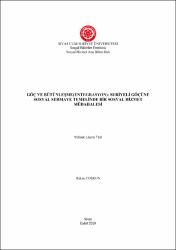| dc.contributor.advisor | Gönültaş, Miraç Burak | |
| dc.contributor.author | Coşkun, Hakan | |
| dc.date.accessioned | 2022-04-28T09:21:40Z | |
| dc.date.available | 2022-04-28T09:21:40Z | |
| dc.date.issued | 2019 | tr |
| dc.date.submitted | 2019-09-06 | |
| dc.identifier.other | x | |
| dc.identifier.uri | https://hdl.handle.net/20.500.12418/12586 | |
| dc.description.abstract | Bu çalışmanın amacı 2011 yılında savaş ortamından dolayı ülkelerinden zorunlu
olarak ayrılmak durumunda kalan Suriyeli göçmenlerin entegrasyon konusunu sosyal
sermaye kuramı ile açıklayarak bir sosyal hizmet müdahale önerisi oluşturmaktır.
Sosyal sermaye kuramı ortak değer ve durumlara odaklanarak entegrasyon için bir
takım bağlar oluşturmaktadır. Bu sebeple araştırmanın kuramsal alt yapısı sosyal
sermaye kuramı doğrultusunda şekillenmiştir. Araştırma nitel yöntemle yürütülmüştür.
Çalışma dahilinde hem yerel halktan hem de göçmen bireylerle görüşmeler
gerçekleştirilmiş ve gözlemlerde bulunulmuştur. Araştırma içerisinde 18 yerli katılımcı
15 göçmen katılımcı ile görüşmeler yapılmıştır. Göç konusunun deneyimler üzerine inşa
edilen bir olgu olmasından ötürü araştırma nitel yöntem ve teknikler doğrultusunda
gerçekleştirilmiştir. Bu noktada nitel araştırmaya ait görüşme ve gözlem tekniklerinden
faydalanılmıştır. Yerli katılımcıların belirlenmesine önce kriter örnekleme ile başlanmış
sonrasında kartopu örneklemde kullanılmıştır. Aynı şekilde göçmen bireylerin
belirlenmesi de kriter örnekleme ile sağlanmıştır. Bu noktada yerli katılımcılar Suriyeli
göçmenlerle temas halinde olanlardan, göçmen katılımcılarda Türk Kızılay’ı Gaziantep
Toplum Merkezinden hizmet alan katılımcılardan oluşmuştur. Çalışmanın veri toplama
yöntemleri derinlemesine görüşme ve gözlem yöntemlerinden oluşmaktadır. Çalışma
göçmen birey ve yerli katılımcıların deneyimleri odağında sürmüştür.
Bu araştırmada ulaşılan bulgular: Yerel halk; din, coğrafi yakınlık, kültürel
benzerlik, Osmanlıdan dolayı tarihsel geçmiş ve akrabalık bağlarını sosyal sermaye
yapıcı değerler olarak görmektedir. Benzer değerleri göçmen bireylerde ifade etmiştir.
Ancak göçmen birey Osmanlıdan dolayı oluşan tarihsel geçmişi bir sosyal sermaye
oluşturucu değer olarak görmemektedir. Bütünleşme her iki kesim içinde mümkün
görünmektedir. Bu noktada bütünleşme araçları olarak dil ve eğitim konusu ifade
edilmiştir. Buna ek olarak her iki taraf için ekonomik durum ve kalifiye göçmenler
konularının da bütünleşme açışımdan etkili olduğu belirtilmiştir. Ayrıca Yerli halkın en
temel ihtiyaç ve beklentileri; iş durumları, konut kiraları, göçmen bireylerin sayısal
çokluğu, göçmen bireyin hukuk ve toplumsal kurallar açısından yetersiz olması, göçün
iyi yönetilememesi ve Türk aile yapısı ve toplumsal dokusunda oluşacak
zedelenmelerin engellenmesi konusudur. Göçmen bireylerin ihtiyaç ve beklentileri ise;
istihdam, vatandaşlık konusu, dil eğitimi ve çocuklarının durumlarıdır. Son olarak her
iki kesimde Sivil Toplum Kuruluşları (STK) ve devlet işbirliğinin artırılması ve her iki
xiii
gruba yönelik bilinçlendirme ve farkındalık çalışmalarının yapılmasını önemli
görmektedir. Bu çalışma ile sunulan müdahale önerisinin literatürde bütünleşme
konusunda sosyal sermaye kavramı ile göç ve sosyal hizmet alanlarına yeni bir bakış
açısı sunacaktır. | tr |
| dc.description.abstract | The aim of this study is to form a social service intervention proposal by
explaining the integration issue of Syrian immigrants who had to leave their countries
due to the war environment in 2011 with the social capital theory. Social capital theory
focuses on common values and situations and forms a set of links for integration. For
this reason, the theoretical infrastructure of the research has been shaped in line with
social capital theory. The research was conducted with qualitative method. Within the
scope of the study, interviews were conducted with both local people and migrant
individuals and observations were made. 18 local participants and 15 migrant
participants were interviewed. Since migration is a phenomenon built on experiences,
the research has been carried out in accordance with qualitative methods and
techniques. At this point, interview and observation techniques of qualitative research
were used. The determination of the local participants was started with criterion
sampling and then snowball was used in the sampling. Likewise, the identification of
immigrant individuals was provided by criterion sampling. At this point, the local
participants were in contact with the Syrian migrants and the immigrant participants
were from the Türk Kızılay Gaziantep Toplum Merkezi. The data collection methods of
the study consist of in-depth interview and observation methods. The study focused on
the experiences of migrant individuals and local participants.
Findings obtained in this study; local people see religion, geographical
proximity, cultural similarity, historical past and kinship ties due to the Ottoman Empire
as social capital constructive values. He expressed similar values in immigrant
individuals. However, the immigrant individual does not see the historical past due to
the Ottoman Empire as a social capital-forming value. Integration seems to be possible
in both segments. At this point, the issue of language and education were expressed as
integration tools. In addition, the economic situation and qualified immigrants for both
sides were reported to be influential in terms of integration. In addition, the basic needs
and expectations of indigenous people; business situations, housing rents, numerical
multiplicity of immigrant individuals, inadequate immigrant individuals in terms of law
and social rules, poor immigration management and prevention of damages in Turkish
family structure and social tissue. The needs and expectations of migrant individuals
are; employment, citizenship, language education and children's situations. Finally, it
considers it important to increase the cooperation between Non-Governmental
xv
Organizations (NGO) and the state in both groups and to raise awareness and awareness
activities for both groups. The intervention proposal presented in this study will provide
a new perspective on the concept of social capital and migration and social services in
the literature. | tr |
| dc.language.iso | tur | tr |
| dc.publisher | Sivas Cumhuriyet Üniversitesi-Sosyal Bilimler Enstitüsü | tr |
| dc.rights | info:eu-repo/semantics/openAccess | tr |
| dc.subject | Sosyal Sermaye | tr |
| dc.subject | Göç | tr |
| dc.subject | Bütünleşme | tr |
| dc.subject | Sosyal Hizmet | tr |
| dc.title | Göç Ve Bütünleşme(Entegrasyon): Suriyeli Göçüne Sosyal Sermaye Temelinde Bir Sosyal Hizmet Müdahalesi | tr |
| dc.type | masterThesis | tr |
| dc.contributor.department | Sosyal Bilimler Enstitüsü | tr |
| dc.relation.ec | xvi, 257 | |
| dc.relation.publicationcategory | Tez | tr |















